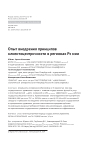Potential for Economic Sanctions Effectiveness
DOI: 10.33917/es-3.195.2024.34-43
The article analyzes mechanisms of sanctions action and the problems that are faced by countries that use this political instrument. Particular attention is paid to cases of applying sanctions against the Russian Federation and Iran without expressing any subjective opinion on the legality of these countries’ actions. It is proved that economic sanctions in most cases are fraught with economic costs for all participants in sanctions episodes, including countries that initiate these sanctions. The country, against which the sanctions are imposed, is likely to develop trade relations with the third parties that do not participate in the sanctions coalition.
References:
1. Alekseeva T.A. Sovremennaya politicheskaya mysl’ (XX–XXI vv.): politicheskaya teoriya i mezhdunarodnye otnosheniya [Modern Political Thought (XX–XXI centuries): Political Theory and International Relations]. Moscow, Aspekt Press, 2015.
2. Timofeev I.N. Ekonomicheskie sanktsii kak politicheskoe ponyatie [Economic Sanctions as a Political Concept]. Vestnik MGIMO-Universiteta, 2018, no 2(59), pp. 26–42, DOI: 10.24833/2071-8160-2018-2-59-26-42
3. ES i SShA otsenivayut vliyanie sobstvennykh sanktsiy v otnoshenii Rossii [The EU and the US Assess the Impact of their own Sanctions Against Russia]. Otkrytyy zhurnal, 2022, 5 marta, available at: https://journal.open-broker.ru/results/itogi-nedeli-ot-5-marta-2022/
4. Khaffbauer G., Shott D., Elliot K., Egg B. Peresmotr ekonomicheskikh sanktsiy [Revision of Economic Sanctions]. Elsevier. Zhurnal mezhdunarodnoy ekonomiki, 2007, vol. 76(1), pp. 135–137.
5. Rezolyutsiya 1929, prinyataya Sovetom Bezopasnosti na ego 6335-m zasedanii 9 iyunya 2010 g. [Resolution 1929, Adopted by the Security Council at its 6335th Meeting on 9 June 2010]. Sovet Bezopasnosti OON, available at: https://www.un.org/securitycouncil/ru/s/res/1929-%282010%29













